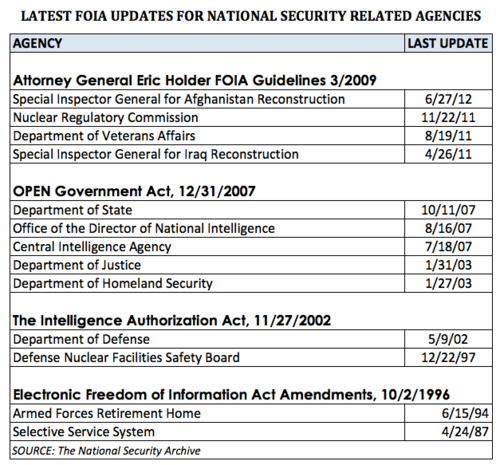Tracking your e-mails? The National Security Administration has those covered by the billions.
Searching its own e-mails the request of a reporter? Well, umm, sorry, can’t do that.
Tracking your e-mails? The National Security Administration has those covered by the billions.
Searching its own e-mails the request of a reporter? Well, umm, sorry, can’t do that.
The latest audit by The National Security Archive shows no federal agencies that are involved in national security have updated their Freedom of Information Act guidelines in recent months — despite a now four-year-old mandate from the Obama administration to do so.
Four agencies have made updates since the March 2009 request from Attorney General Eric Holder that was preceded by a request from President Obama. (See chart below).
But nine other national security related agencies have made no updates since before the administration’s new guidelines — one hasn’t made changes since1987 — despite not only the Obama-Holder mandate, but also three major changes in FOIA laws since 1996.
Those are the same numbers that were reported by The National Security Archive in December; this week’s audit update includes changes made since the December news release. Only two additional federal agencies have made changes since December.
President Obama in an executive order on Jan. 21, 2009 ordered “presumption in favor of disclosure” and asked agencies to “harness new technologies to put information about their operations and decisions online and readily available to the public.” The attorney general followed up with detailed guidelines two months later.

(Updated 1:20 p.m. CT 12/5)
Only four agencies involved in national security have updated their Freedom of Information Act policies since the White House issued a directive for more aggressive compliance in 2009, according to data released yesterday from the latest FOIA audit by the National Security Archive.
Nine others, including State, Justice, Defense and Homeland Security, haven’t updated their regulations since major FOIA-related legislation in 2007 — or, in some cases, 2002 or 1996.
President Obama in an executive order on Jan. 21, 2009 ordered “presumption in favor of disclosure” and asked agencies to “harness new technologies to put information about their operations and decisions online and readily available to the public.”
This year’s Knight Open Government Survey by the archive found that 62 of 99 agencies have not updated since the attorney general issued a memo to agency heads following up on the president’s order. In its previous audit, 49 of 90 agencies surveyed had made at least some progress in meeting the administration’s requests.
Defense, Homeland Security and National Intelligence were listed in the previous audit as having had taken at least one step to comply with the White House; OTB asked the National Security Archive to clarify why they are now listed as not having changed their policies. ” ‘Updated regulations’ means entered new regulations into the Federal Register,” Nate Jones said via e-mail. A a positive rating in an earlier audit could be earned without necessarily updating the regulations, he said.
Jones said DOD has told him its regulations are completed but “some kind of oversight” kept them from being published in the register. “They say they will soon,” Jones said.
“Outdated agency regulations really mean there’s an opportunity here for a second-term Obama to standardize best practices and bring all the agencies up to his day-one openness pledge,” Tom Blanton, director of the National Security Archive, said in a release about the 2012 audit findings.
The archive contends, “The primary cause of this FOIA failure has been the inability of Congress and the White House to find a way to compel recalcitrant agencies to comply with FOIA.”

Here are the agencies that are included in FOIA online:
→ Sunshine in Government Blog story

See for yourself:

While there has been some progress in increasing transparency and accountability in government under the Obama administration, “as far as we can tell from existing numbers, those policies have yet to fully change the direction of government,” a new report on government secrecy released today says.
“Efforts to open the government continue to be frustrated by a governmental predisposition towards secrecy, especially in the national security bureaucracy,” the 2012 Secrecy Report from OpenTheGovernment.org says.
“Among the troubling trends: the National Declassification Center will not meet its goal for declassifying old records on time; the government continues to use the state secrets privilege in the same way it did prior to release of a new procedural policy; and the volume of documents marked “Classified” continues to grow, with little assurance or reason offered for the decision that the information properly needs such protection.
Encouraging signs are seen, including more FOIA requests processed; disclosure of spending on intelligence; and a dip in the number of government workers who can declare information a secret, a summary of the report notes.
Here is a “snapshot” in the report on highlights:

“Grade inflation” is what the National Security Archive howls about a new Department of Justice internal analysis of its compliance with the Freedom of Information Act.
“Primarily, …the DOJ OIP has, once again, cooked its books to omit huge quantities of unfulfilled FOIA requeststs from its analyses,” a post on the archive’s Unredacted site declares.
Conceding the report is overall “a useful synthesis of information,” the archive says it falls down on the key metric that proclaims “records are released in “more than 92 percent of requests where records are processed for disclosure.”
The problem is requests NOT processed for disclosure. “These non-processed (and apparently non-counted) requests include those that were denied due to: fees (pricing requesters out); referrals (passing the request off to another agency while the requester still waits); “no records” responses (very frequently the result of inadequate searches); and requests “improper for other reasons” (which ostensibly include the “can neither confirm nor deny” glomar exemption).”
Earlier this year, the National Security Archive awarded the DOJ its “Rosemary Award” for “worst open government performance by a government agency.”